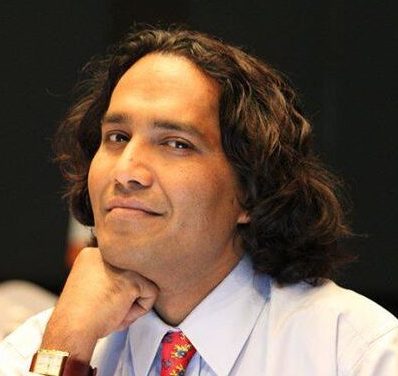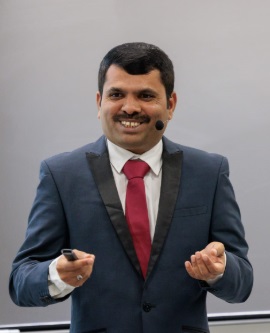
Prof. Vishwas Chavan
EarthSight Foundation
School of Inspirational Living
Pune 411015, India
Email: chavan.vishwas(at)gmail.com
Short Bio: Prof. Vishwas Chavan is a researcher-cum-academician, who has a successful stint in national & international science diplomacy leading to local-to-global scale collaborations. Dr Chavan also has a proven track record of breaking new ground, e.g. Conceptualizing data-intensive research & policy planning in environmental sciences, biodiversity, ecology and sustainable development. Prof. Chavan has implemented over 2-dozen research & development projects both nationally and internationally. These projects have received significant funding (national & international) in cross-disciplinary areas of information and communication technology applications in marine, environment, biodiversity, ecology and sustainability sciences. He has vast experience in leading national & international projects and initiatives. He has published about 60 research papers in high-impact factor journals, including in Nature. His idea of data publishing in S&T in the form of ‘data papers’ has given rise to numerous data journals, e.g. Scientific Data, and Biodiversity Data Journal. Prof. Chavan is also an accomplished author, inspirational speaker, and futurist. As a success strategist and entrepreneurship mentor, Dr Chavan has worked with academic, research and professional organisations in an advisory capacity, both nationally and internationally.
Talk Title: Beyond Innovation: Where GITA Converge to Redefine Our Planet-Centric Future
Abstract:
GITA, the integration of Generative AI (GenAI), Information and Communication Technologies (ICT), and Big Data Analytics is transforming worldwide initiatives in biodiversity conservation, climate change mitigation, and sustainable development. Utilizing Edge-Cloud Continuum architecture, GITA facilitates a transition from reactive to predictive stewardship, enhancing real-time decision-making, anticipatory action, and dynamic ecosystem management.
This talk demonstrates how GITA empowers conscious ecosystems, facilitating self-aware woods, oceans, and cities via AI-driven drones, digital replicas of towns and farms, and climate forecasting models. Real-time edge processing and cloud-based machine learning improve biodiversity conservation, precision agriculture, and disaster readiness. Case examples from India's initiatives in predictive agriculture, wildfire detection, and flood forecasting illustrate GITA's revolutionary capabilities.
The work promotes a transition from human-centric to planet-centric AI, highlighting the necessity of ethical AI governance that prioritizes biodiversity, sustainability, and justice. This article presents a framework for planet-first AI, grounded in the principles of Dharma (moral duty) and Vishwa Chetana (universal consciousness), to achieve the UN Sustainable Development Goals (SDGs).
Keywords: Generative AI, Edge-Cloud Continuum, Predictive Stewardship, Planet-Centric AI, Biodiversity Conservation, Climate Mitigation, Sustainable Development, GITA Framework, Digital Twins, Conscious Ecosystems.

Dr. Shivananda R Poojara, Ph.D
Solution Architect- Cloud and Edge Computing
Airowire Networks Private Limited
Bengaluru, India
Email: shivanand@airowire.com, shivu.poojar@gmail.com
Short Bio: Dr. Shivananda R. Poojara holds a Ph.D. from the University of Tartu, Estonia, and currently serves as a Solution Architect for Cloud and Edge Computing at Airowire. With over a decade of expertise in digital transformation and consulting, he has been worked with many technologies landscape primarily cloud, edge computing, enterprise networks and IoT systems. He has conducted research in scalable IoT data processing using serverless technologies. His research interests focus on serverless computing, edge analytics, fog computing, and cloud computing.
Dr. Poojara is a member of prestigious organizations such as IEEE, IET, and ISTE, and worked at Nokia R&D Labs and was honored with the Infosys Distinguished Facilitator Awar. Committed to knowledge-sharing, he has delivered numerous workshops and technical seminars, reaching the students across India, Estonia, and Malaysia. Dr. Poojara is also the co-author of Mastering Cloud Computing, published by McGraw Hill India, which has been adopted as a textbook in several universities.
Talk Title: From Concept to Implementation : Navigating the Journey to HyperAutomation in real time Network and Cloud Operations
Abstract:
In today’s data-driven, fast-paced digital world, managing multiple data sources and streamlining processes for faster time-to-market is a significant challenge. Enterprises now seek solutions that unify data into a single source of truth, enhancing business value and reducing manual work. HyperAutomation has emerged as a transformative solution, empowering companies to elevate productivity and optimize operations. HyperAutomation is the next level of automation evolved over the years with eco-system of technologies like RPA, AI, ML, and process management to automate complex workflows end-to-end. Going beyond traditional automation, it introduces intelligence, scalability, and real-time insights, enabling organizations to improve efficiency, lower costs, and boost agility, driving comprehensive digital transformation.
In this keynote, we explore the HyperAutomation landscape, its key drivers, and the ecosystem. We present a comprehensive view of HyperAutomation framework, designed to streamline network, and security operations. Through real-world use cases and technology stack, we showcase how HyperAutomation will deliver measurable ROI and tangible benefits to the clients.